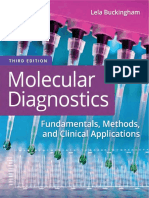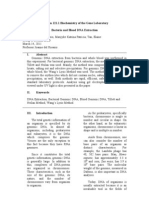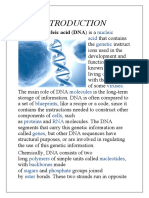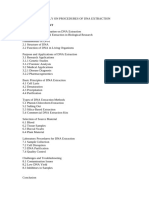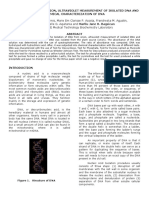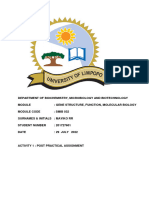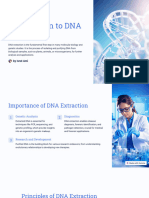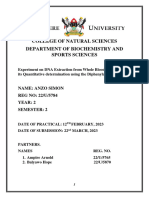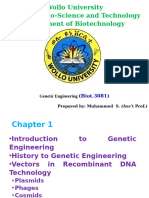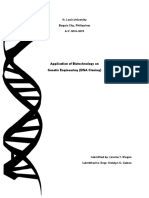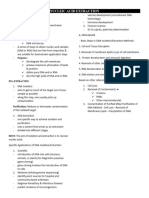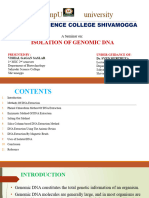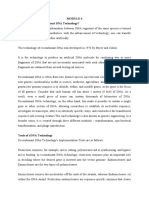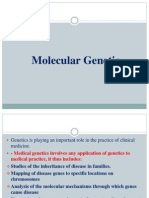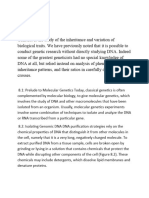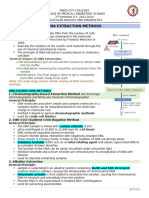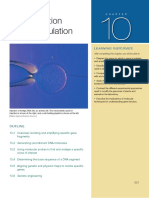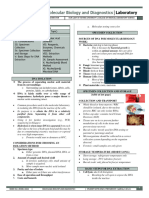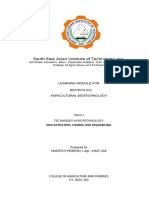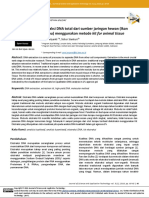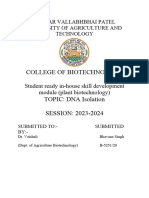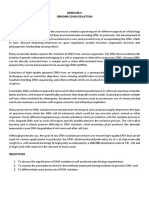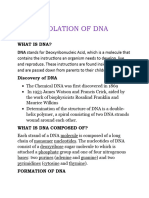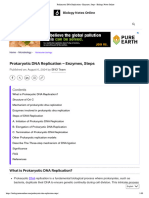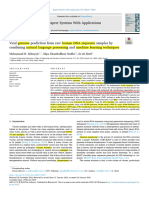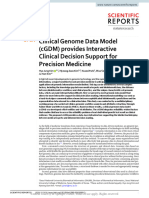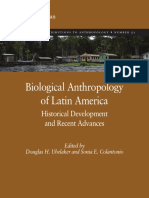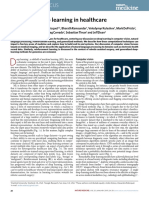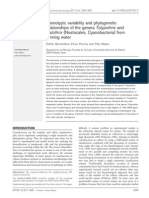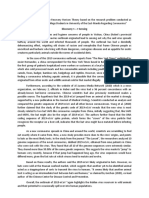0 ratings0% found this document useful (0 votes)
42 viewsDna Extraction Simulation
Dna Extraction Simulation
Uploaded by
Pamela Noel MartinezThis document provides an overview of DNA extraction. It describes the phenol/chloroform method to extract cellular DNA. The process involves three stages: cell dissolution to break open cells and nuclei, precipitation to remove proteins and impurities, and purification to isolate pure DNA. DNA extraction is a fundamental technique used in research labs to study DNA and its relation to diseases, develop vaccines and enzymes, and for forensic analysis.
Copyright:
© All Rights Reserved
Available Formats
Download as PDF, TXT or read online from Scribd
Dna Extraction Simulation
Dna Extraction Simulation
Uploaded by
Pamela Noel Martinez0 ratings0% found this document useful (0 votes)
42 views1 pageThis document provides an overview of DNA extraction. It describes the phenol/chloroform method to extract cellular DNA. The process involves three stages: cell dissolution to break open cells and nuclei, precipitation to remove proteins and impurities, and purification to isolate pure DNA. DNA extraction is a fundamental technique used in research labs to study DNA and its relation to diseases, develop vaccines and enzymes, and for forensic analysis.
Original Description:
Principios de la extracción de ADN
Original Title
dna-extraction-simulation
Copyright
© © All Rights Reserved
Available Formats
PDF, TXT or read online from Scribd
Share this document
Did you find this document useful?
Is this content inappropriate?
This document provides an overview of DNA extraction. It describes the phenol/chloroform method to extract cellular DNA. The process involves three stages: cell dissolution to break open cells and nuclei, precipitation to remove proteins and impurities, and purification to isolate pure DNA. DNA extraction is a fundamental technique used in research labs to study DNA and its relation to diseases, develop vaccines and enzymes, and for forensic analysis.
Copyright:
© All Rights Reserved
Available Formats
Download as PDF, TXT or read online from Scribd
Download as pdf or txt
0 ratings0% found this document useful (0 votes)
42 views1 pageDna Extraction Simulation
Dna Extraction Simulation
Uploaded by
Pamela Noel MartinezThis document provides an overview of DNA extraction. It describes the phenol/chloroform method to extract cellular DNA. The process involves three stages: cell dissolution to break open cells and nuclei, precipitation to remove proteins and impurities, and purification to isolate pure DNA. DNA extraction is a fundamental technique used in research labs to study DNA and its relation to diseases, develop vaccines and enzymes, and for forensic analysis.
Copyright:
© All Rights Reserved
Available Formats
Download as PDF, TXT or read online from Scribd
Download as pdf or txt
You are on page 1of 1
Biology Molecular Biology
DNA Extraction
General Aim Theoretical Background/Context (Cont’)
To extract cellular DNA using phenol/chloroform DNA has been the target of a lot of research.
method. Investigation of the DNA structure and sequence
in relation to diseases helped in finding out the
Method molecular basis and cure for various diseases.
Phenol/chloroform method. DNA study also allowed the production of many
vaccines, hormones and enzymes. DNA study was
Learning Objectives (ILOs) also very beneficial in the forensic/medico legal
Demonstrate proficiency with the protocol involved entities. To study DNA it must be extracted out of
in DNA extraction. the cell, Hence; DNA extraction technique is
Identify the role of specific reagents and equipment widely used in research labs.
in the extraction of DNA. The isolation of the DNA is done in stages:
Practice basic laboratory techniques.
1. Cell dissolution: In this stage the cell and the
Conclude downstream applications of DNA
nucleus are broken to extract a DNA sample using
extraction.
a lysis buffer.
2. Precipitation: In this stage, proteins and impurities
Theoretical Background/Context are removed from the sample.
3. Purification: This stage involves isolating the DNA
DNA (deoxyribonucleic acid) is a complex molecule
completely from the other substances, for a final
that contains the genetic material of a cell. It defines
eluted pure DNA sample preserved in a buffer.
the structure and the functions of a living organism.
DNA is also responsible for heredity. Principle of Work
DNA is composed of a series of nucleotides linked The extraction of DNA involves lysis of cellular and
together. These nucleotides are basically made of a nuclear membranes to extract DNA from within. This
nitrogenous base, a molecule of sugar (deoxyribose) is followed by separation of DNA from impurities,
and a phosphate group. The sequence of nucleotides proteins, and other substances. DNA extraction
in the DNA molecule determines the hereditary traits usually proceeds through three stages:
of a cell. Nucleotides are packed to fit inside the cell.
1. Cell dissolution: where the cell and the nucleus are
DNA takes the shape of a double helix, which, in
broken to extract DNA into the buffer.
addition to the DNA molecule contains bound
proteins. DNA double helix is enclosed inside a cell 2. Precipitation: where proteins and impurities
membrane in case the cell doesn’t have a nucleus like are removed from the sample.
in prokaryotes, and inside the nuclear membrane in 3. Purification: This final stage involves further
cells with nuclei like in eukaryotes. purification of DNA to get a completely pure
DNA sample ready to be used for downstream
applications.
www.praxilabs.com
You might also like
- Molecular DiagnosticsDocument583 pagesMolecular DiagnosticsAnthony93% (14)
- Justice Jensen - Virtual Notebook 113 - 10046426.3Document6 pagesJustice Jensen - Virtual Notebook 113 - 10046426.3Justice JensenNo ratings yet
- Ion Torrent TorrentSuite Guide Version 3.4.1Document346 pagesIon Torrent TorrentSuite Guide Version 3.4.1klayNo ratings yet
- Chapter 9Document39 pagesChapter 9Anupa GhoseNo ratings yet
- Title: Isolation of Genomic DNA From Bacteria, Onion, Spleen or Liver and Blood Through TheDocument1 pageTitle: Isolation of Genomic DNA From Bacteria, Onion, Spleen or Liver and Blood Through Thesally ngNo ratings yet
- Biochem 121 Big Paper 1Document11 pagesBiochem 121 Big Paper 1Elaine TanNo ratings yet
- Nucleic Acid Genetic: Deoxyribonucleic Acid (DNA) Is ADocument11 pagesNucleic Acid Genetic: Deoxyribonucleic Acid (DNA) Is ATushar GulatiNo ratings yet
- Tracking The RecombinantDocument12 pagesTracking The RecombinantCorp LarscaNo ratings yet
- DNA ExtractionDocument12 pagesDNA Extractionmarychiamaka11No ratings yet
- 9 - Dna Technology - SalesDocument49 pages9 - Dna Technology - SalesJazel SalesNo ratings yet
- DNA Isolation From Onion, Ultraviolet Measurement of Isolated DNA and Chemical Characterization of DNADocument6 pagesDNA Isolation From Onion, Ultraviolet Measurement of Isolated DNA and Chemical Characterization of DNAmarilujaneNo ratings yet
- SMIB032 Post Practical AssignmentDocument5 pagesSMIB032 Post Practical Assignment2023422047No ratings yet
- Dna Barcoding and FingerprintingDocument53 pagesDna Barcoding and Fingerprintingian clyds christian sanielNo ratings yet
- DNA Extraction From BananaDocument2 pagesDNA Extraction From BananaJylla Angway0% (1)
- Introduction To DNA ExtractionDocument8 pagesIntroduction To DNA Extractionisratami108No ratings yet
- DNA Extraction Pro Max 2024Document17 pagesDNA Extraction Pro Max 2024Anzo SimonNo ratings yet
- Day 3Document8 pagesDay 3Kinberly AnnNo ratings yet
- Genetic EngineeringDocument454 pagesGenetic Engineeringhunderaeshetu868No ratings yet
- ELS - Q2 - Week 4aDocument11 pagesELS - Q2 - Week 4aShekaina Faith Cuizon LozadaNo ratings yet
- Application of Biotechnology On Genetic Engineering (DNA Cloning)Document4 pagesApplication of Biotechnology On Genetic Engineering (DNA Cloning)Jerome MagnoNo ratings yet
- Wong Pui Mun - Practical 4Document6 pagesWong Pui Mun - Practical 4门门No ratings yet
- Dna ExtractionDocument21 pagesDna ExtractionXian LeeNo ratings yet
- Biochem Prac 1 Activity 01Document3 pagesBiochem Prac 1 Activity 01Dithet MalonNo ratings yet
- Nucleic Acid ExtractionDocument1 pageNucleic Acid ExtractionKrystel Bea DinqueNo ratings yet
- Useful To Human. Analogues For Products and Services: BIOTECHNOLOGY - Principles and ProcessesDocument10 pagesUseful To Human. Analogues For Products and Services: BIOTECHNOLOGY - Principles and ProcessesKorou LaikhaNo ratings yet
- Genomic DNA IsolationDocument15 pagesGenomic DNA IsolationAdultNo ratings yet
- Module 4Document25 pagesModule 4Saalif RahmanNo ratings yet
- Lab-2 Genet Ic DNA Isolation Methods-1Document27 pagesLab-2 Genet Ic DNA Isolation Methods-1Samyak ShahNo ratings yet
- Lecture Noteon Basic Molecular TechniquesDocument3 pagesLecture Noteon Basic Molecular Techniquesjaymike5423No ratings yet
- 2 - Principles of Genetic EngineeringDocument42 pages2 - Principles of Genetic Engineeringfaredalnaser008No ratings yet
- University of Poonch RawalakotDocument18 pagesUniversity of Poonch RawalakotAbdul qadeerNo ratings yet
- Rdna BioDocument27 pagesRdna Bioabhishektatu2007No ratings yet
- Dna Extraction MethodsDocument3 pagesDna Extraction MethodsLynch Devin Kirtug-SalengNo ratings yet
- Bio ProjectDocument21 pagesBio ProjectabhayNo ratings yet
- DNA Extraction From StrawberryBananaKiwi LABORATOYDocument6 pagesDNA Extraction From StrawberryBananaKiwi LABORATOYCHALSEA DYANN JOIE GALZOTENo ratings yet
- Genetic AnalysisDocument42 pagesGenetic AnalysisScourge BlackthornNo ratings yet
- MODX LAB 2 - DNA IsolationDocument7 pagesMODX LAB 2 - DNA Isolationbsramos2023No ratings yet
- DNAzolR A Reagent For The Rapid Isolation of GenomDocument5 pagesDNAzolR A Reagent For The Rapid Isolation of GenomGabriela Daniela Sandoval GámezNo ratings yet
- Activity 3 - Dna IsolationDocument4 pagesActivity 3 - Dna IsolationMemeowwNo ratings yet
- MBIO 404 Assighnment 02 181-025-031Document12 pagesMBIO 404 Assighnment 02 181-025-031Razia UrmiNo ratings yet
- BhawnaDocument7 pagesBhawnaHimanshuNo ratings yet
- South East Asian Institute of Technology, Inc.: Learning Module For Biotech 211 Agricultural BiotechnologyDocument7 pagesSouth East Asian Institute of Technology, Inc.: Learning Module For Biotech 211 Agricultural BiotechnologyBMontepio, Christian LloydNo ratings yet
- What Is DNA Replication? - Steps, Enzymes, Mechanism, ApplicationsDocument97 pagesWhat Is DNA Replication? - Steps, Enzymes, Mechanism, ApplicationsSourav PanNo ratings yet
- Nucleic Acid PreparationDocument6 pagesNucleic Acid PreparationDemetrio BenitezNo ratings yet
- Ekstraksi DNA Total Dari Sumber Jaringan Hewan (Ikan Kerapu) Menggunakan Metode Kit For Animal TissueDocument6 pagesEkstraksi DNA Total Dari Sumber Jaringan Hewan (Ikan Kerapu) Menggunakan Metode Kit For Animal TissueEka ErmayaniNo ratings yet
- Dna Extraction ThesisDocument5 pagesDna Extraction Thesistiffanyyounglittlerock100% (2)
- Dna Extraction and Polymerase Chain Reaction.9Document2 pagesDna Extraction and Polymerase Chain Reaction.9tharisma khairunnisaNo ratings yet
- ShraddhaDocument8 pagesShraddhaHimanshuNo ratings yet
- DNA SequencingDocument30 pagesDNA Sequencingah9426237No ratings yet
- ShraddhaDocument6 pagesShraddhaHimanshuNo ratings yet
- Lab Report 4Document13 pagesLab Report 4Farah TubasiNo ratings yet
- GCMBDocument5 pagesGCMBHarshita SinhaNo ratings yet
- DNA and The Gene, Synthesis and Repair, ReplicationDocument29 pagesDNA and The Gene, Synthesis and Repair, Replicationna23csb0f03No ratings yet
- Ex. 5 DNA Extraction PDFDocument3 pagesEx. 5 DNA Extraction PDFAlyssa Pauline PalacioNo ratings yet
- Bio ProjectDocument13 pagesBio ProjectSuyash AgrawalNo ratings yet
- Prokaryotic DNA Replication - Enzymes, Steps - Biology Notes OnlineDocument80 pagesProkaryotic DNA Replication - Enzymes, Steps - Biology Notes OnlineSourav PanNo ratings yet
- I. Title of Experiment II. Date of Experiment III. Purpose of ExperimentDocument25 pagesI. Title of Experiment II. Date of Experiment III. Purpose of Experimentbalqis l zahroNo ratings yet
- تقريرDocument15 pagesتقريرAhmed AliNo ratings yet
- The DNA Detective: Unraveling the Mysteries of Our Genetic CodeFrom EverandThe DNA Detective: Unraveling the Mysteries of Our Genetic CodeNo ratings yet
- Gene Editing, Epigenetic, Cloning and TherapyFrom EverandGene Editing, Epigenetic, Cloning and TherapyRating: 4 out of 5 stars4/5 (1)
- 26 NGSreview-MuradDocument9 pages26 NGSreview-MuradTanvir HasanNo ratings yet
- Viral Genome Prediction From Raw Human DNA Sequence Samples by Combining Natural Language Proc-1Document10 pagesViral Genome Prediction From Raw Human DNA Sequence Samples by Combining Natural Language Proc-1m.albaiti111No ratings yet
- Andhra Pradesh State Council of Higher Education Cbcs Pattern For Human GeneticsDocument40 pagesAndhra Pradesh State Council of Higher Education Cbcs Pattern For Human GeneticsSamrat KumarNo ratings yet
- Lecture 1 and 2 BGE - IntroDocument81 pagesLecture 1 and 2 BGE - Introaishah1997No ratings yet
- Clinical Genomic DataDocument14 pagesClinical Genomic DatamarcoNo ratings yet
- Real-Time PCR Automations of Quant Studio 5 and MA6000 PlusDocument15 pagesReal-Time PCR Automations of Quant Studio 5 and MA6000 PlusDayledaniel SorvetoNo ratings yet
- 355 Homework 1Document16 pages355 Homework 1zeynoleeeNo ratings yet
- s00705 021 05348 9 PDFDocument5 pagess00705 021 05348 9 PDFmesele tilahunNo ratings yet
- Mark Scheme (Results) January 2022Document16 pagesMark Scheme (Results) January 2022윤소리No ratings yet
- Semana 2 (1) Douglas y Ubelaker (Eds.) (2019)Document402 pagesSemana 2 (1) Douglas y Ubelaker (Eds.) (2019)Arturo SanabriaNo ratings yet
- A Guide To Deep Learning in HealthcareDocument6 pagesA Guide To Deep Learning in HealthcareJeffrey SwansonNo ratings yet
- Tolypothrix DistortaDocument13 pagesTolypothrix DistortaIrinaSalariNo ratings yet
- Identification of Five Cytotoxicity-Related GenesDocument12 pagesIdentification of Five Cytotoxicity-Related GenesFiona TranNo ratings yet
- Discovery SensingDocument3 pagesDiscovery Sensingela kikayNo ratings yet
- Generally Recognized As Safe (GRAS) PhosphateDocument7 pagesGenerally Recognized As Safe (GRAS) PhosphatemuhammadrafiqyNo ratings yet
- Leukodystrophies and Genetic Leukoencephalopathies in Children Specified by Exome Sequencing in An Expanded Gene PanelDocument9 pagesLeukodystrophies and Genetic Leukoencephalopathies in Children Specified by Exome Sequencing in An Expanded Gene PanelEduardo Rios DuboisNo ratings yet
- Reviews: Next-Generation Computational Tools For Interrogating Cancer ImmunityDocument23 pagesReviews: Next-Generation Computational Tools For Interrogating Cancer ImmunityThị Sô PhiaNo ratings yet
- Question 2Document14 pagesQuestion 2ANIS HUMAIRA ABDUL HAFIZNo ratings yet
- (Acero) Week 4 PT - Research Report On Immunotherapy and Its AdvancementsDocument3 pages(Acero) Week 4 PT - Research Report On Immunotherapy and Its AdvancementsPaul AceroNo ratings yet
- Scope and Application of Genetic Engineering RS Maam HWDocument29 pagesScope and Application of Genetic Engineering RS Maam HWRani SapkotaNo ratings yet
- pET-38b (+) Vector: Developed Through Collaboration Between Novagen and CBD Technologies, IncDocument2 pagespET-38b (+) Vector: Developed Through Collaboration Between Novagen and CBD Technologies, Incjacobo urbinaNo ratings yet
- Innovations at IIT Bombay For: COVID-19Document32 pagesInnovations at IIT Bombay For: COVID-19Aman ShahNo ratings yet
- Introduction To Ion Torrent™ Technology & WorkflowDocument60 pagesIntroduction To Ion Torrent™ Technology & Workflowhadymatrix100% (1)
- A Modern ApproachDocument6 pagesA Modern Approachadzeinmabrook14No ratings yet
- Pi Is 1440244020305284Document6 pagesPi Is 1440244020305284NisaNo ratings yet
- Preliminary Taxonomic Survey and Molecular Documentation of Jellyfish Species (Cnidaria: Scyphozoa and Cubozoa) in MalaysiaDocument19 pagesPreliminary Taxonomic Survey and Molecular Documentation of Jellyfish Species (Cnidaria: Scyphozoa and Cubozoa) in MalaysiaSalma anjaliya.No ratings yet
- 8 - MutationDocument17 pages8 - MutationTo RiNo ratings yet
- Gen Bio PDFDocument14 pagesGen Bio PDFJenneriza DC Del RosarioNo ratings yet
